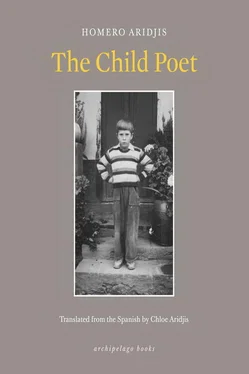My father was always patient with Raimundo because he’d help him arrange tax matters and documents for the store, in exchange for five free meals a year and clothing he’d ask for on credit but never pay for. Tipped off by the butcher, our maid’s boyfriend, Raimundo would arrive and from the dining room door ask, “Am I disturbing you, sir …? I’ve just come to tell you that your papers are ready,” etc. He then drew up a chair and sat down with us, talking incessantly. Only once he was certain of a chicken breast on his plate would he shut up.
My uncle never talked. He ate in silence, as if angry, repeatedly scratching his arms. He would eat and leave, with never a thank-you or a goodbye. His whole attitude, from the very start, seemed like an insult. He dealt in animals: donkeys, cows, and horses, but just to compete with my father, he opened a clothing store one day and began selling seeds, though he spent more time gossiping than making money. And once he’d turned into a rival, he quickened his step each time he passed our store to avoid saying hello. And he’d walk past several times a day to show how angry he was. Whenever she saw him my mother would say to my father, “There goes Carlos, snorting with rage.”
Sebastián, my mother’s brother, lived in Mexico City. He was married to a woman ten years older than him, which didn’t prevent him from having fun with boys; he would put them to work in his studio as assistants in making dolls, wooden toys, and Sacred Hearts of Jesus; amid the Virgins of Guadalupe he’d hug them and kiss them on the mouth.
His house smelled of varnish, wood and paint; his suit, hands and face were always stained. Once a year he would come to Contepec for a week, at Christmas. And whenever he was with my mother, the main topic was always their father, whom he attacked as if seized by a cyclical rancor each time the conversation turned to certain people or included certain words.
“Why should I call father a man who would only lift his leg to pee?” he would ask with rage. “The only things I ever got from that old fool were blows and disdain.” He would grow more violent at my mother’s protests: “Why should I thank that scoundrel, that jackass? No!”
My mother had a photograph of my uncle at age fifteen, with a head full of curls and lips painted in a heart shape, freshly arrived in Mexico City to work as apprentice to a doll maker. His sweater bore a crest with the initials R.S.Z. On the back of the photo was the name Rosaura Sebastián Z.… Seeing him like that, you would have thought he was a young woman in drag.
Before long, my uncle had set up his business and married Marta, the young lady who had come to buy the painting The Death of Manolete , copied from a calendar. She had fallen in love with Sebastián, finding him both artistic and refined. But the day after the wedding, my uncle vanished from morning to night with nothing more than an “I’ll be right back,” the beginning of a long series of escapades that she forgave on account of his infantile and apathetic nature.
Perhaps as a bulwark against loneliness, my aunt found a little old lady, a friend of her mother’s, to live with them. The woman had been a nun who’d been expelled from her convent for being too obsessive. Old people’s homes wouldn’t have her either and kicked her out after a few months because she spent all day in the bathroom. This virgin was given the nickname “The Handwasher” because of her mania for washing her hands. She saw germs everywhere: in greetings, slight grazes, dust, furniture, in the very air. Over the years she reached the point of washing her clothes while wearing them, and ironing them dry while they were on her, several times an hour. She was more hunched over each time my father brought me to Mexico City, and my uncle would point at her and say, “Here before us is a complete question mark.”
As soon as he woke up my uncle would go out, faithfully telling his wife he’d be back in five minutes, and not come home until nighttime. He had breakfast, lunch, and dinner in eateries and restaurants, always alone and always frugal, pretending to be poor, dressed in secondhand suits his relatives sold to him and he paid for in installments. He’d fish out the money from among torn bits of newspaper and old shopping receipts, the peso bills folded together with the thousand-peso ones. He frequented warehouses and spent hours talking about nonexistent shops so they’d lower the price on fabrics, which he then bought and stored in a closet, forgetting about them, or at least seeming to. If he went to visit someone and took a liking to an object in the house, he persisted, through pleas and promises, in trying to obtain it, and if the lady in question (for he only visited ladies) gave in, he took it home and put it in his closet and never took it out again. He always arrived late to appointments, or not at all. And if he made plans to travel with someone to another city, promising to take the train at a certain hour, he simply didn’t show up, knowing full well, from the moment he made the plan days beforehand, that he had no intention of traveling. And whenever he rode in a crowded bus with my aunt and a seat became free, he seized it and left her standing. And if something happened on the street and a person threatened him with violence, he became hysterical and screamed out, “Marti, Marti, Marti … save me from this lunatic!” If at night he felt cold as they walked around downtown, he asked my aunt for her sweater and scarf, put them on, and then took her arm.
Sick peasants would come to our house, stricken with rheumatism, kidney trouble, old age. The skin stretched over their bones looked tanned by misery. Pain seemed frozen into the wretchedness on their faces. They sat on a bench in the main square, beneath the shade of a tree, and waited for my father to administer medicine. Patiently alert, they watched dusk fall over the streets with wide eyes. They’d sit there for hours, with never a word to anyone that they had come to see him. They might even notice when he arrived and was about to leave without speaking to him … And at times, when I was with my father, we heard a hesitant voice calling out behind us, “Señor Nicias?… Señor Nicias?”
And my father would come to a halt. Knowing well what this was about, he walked towards the man who’d called to him, who was propped up by his wife and in too much pain to move.
“What’s the matter with you?” my father asked.
“The sickness, sir, it won’t leave me alone.”
And during a dialogue of few words and many silences, I observed my father and the man watching each other, as if reading each other’s thoughts on their faces.
Until all of a sudden the man burst into tears, saying that his kidneys were killing him and, pouting like a child, that he was very hungry.
On days my father didn’t show up some of the peasants waited until night, taking short walks around the square or going to the market to buy fruit. The darkness slowly engulfed them, turning them and the trees black. Their children played haunted house with the village children, running between the flower beds, emitting feeble cries, stumbling frequently from weakness.
They ran barefoot, in torn and patched trousers, stepping on the grass, clowning around and bumping into passersby.
Often a dog that had come to town with one of the families was lying nearby, and his paws would tremble as he tried to stand up and stretch, as though his legs were too frail to support him.
When she heard that the peasants were waiting for my father, my mother would go tell them the approximate time he was expected back from his trip. But it made no difference whether she told them three in the afternoon or nine at night, it did not seem to diminish their resolve to wait for him, although one could detect weariness and sorrow in their eyes.
Читать дальше












